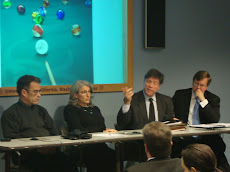Selling drugs and vaccines is not the same as selling baseballs or underwear. Drugs can kill or maim. In the era of patent medicines, sloppy manufacturing sometimes did--thus the Food, Drug and Cosmetic Act was established, to protect the public from dangerous medicinal products.
"[T]he bill ... was ultimately enhanced and passed in the wake of a therapeutic disaster in 1937. A Tennessee drug company marketed a form of the new sulfa wonder drug that would appeal to pediatric patients, Elixir Sulfanilamide. However, the solvent in this untested product was a highly toxic chemical analogue of antifreeze; over 100 people died, many of whom were children. The public outcry not only reshaped the drug provisions of the new law to prevent such an event from happening again, it propelled the bill itself through Congress. FDR signed the Food, Drug, and Cosmetic Act on 25 June 1938.But since 9/11, Congress has voted in provisions for expedited approvals of drugs and vaccines for emergencies, or non-emergent potential emergencies. [Anthrax vaccine's manufacturer, for example, was relieved of liability for adverse reactions through the end of 2015, simply because the vaccine might be needed for an emergency.] Both FDA and DHHS' Assistant Secretary for Preparedness and Response, with input from the Secretary of Homeland Security, have several different means by which unlicensed or even untested drugs and vaccines can be approved for use.
The method that is used the most is a waiver of liability for both manufacturers, professionals administering the drug or vaccine and government program planners: those who approved use of the untried product. This allows manufacturers to get the product on the market with very abbreviated testing. It saves an enormous amount (think $hundreds of millions) that would normally be spent on clinical trials. Sometimes the government performs most of those trials, saving the manufacturer more money, after the product is approved.
In Sweden, 60 percent of the population was vaccinated against the swine flu in 2009.
- Narcolepsy victims in new compensation bid (13 Feb 12)
- First narcolepsy cases receive compensation (7 Oct 11)
- Narcolepsy cases rising after swine flu vaccine (28 May 11)
- Swedish study links swine flu vaccine to narcolepsy (29 Mar 11)
A tally carried out by the European Centre for Disease Prevention and Control (ECDC) after the pandemic had passed found Sweden ended up with a death rate of 0.31 fatalities per 100,000 people.
In Germany, where only eight percent of the population was vaccinated, the fatality figures were the same.
And in Poland, which didn't have any vaccination programme at all, the death rate was only 0.47 per 100,000 , the Svenska Dagbladet (SvD) newspaper reports.
“We concluded that six fatalities were avoided by the mass vaccination programme,” Lisa Brouwers of the Swedish Institute for Communicable Disease Control (Smittskyddsinstitutet) told the newspaper.
In addition, Sweden has documented 168 cases of vaccine-related side effects, compared to only 29 in Germany.
“I feel stupid. What disappoints me most is that it was important that everyone in Sweden was vaccinated. The problem is that you don't get any sort of help afterwards,” 27-year-old Ida Andersson told the Aftonbladet newswpaper.
Andersson suffers from the sarcoidosis in her lungs, inflammation of the face, and abnormal drowsiness attributed to having been vaccinated against the swine flu.
“I don't know if I'll be sick for the rest of my life or if I'll ever get better,” she said.
So far, no explanation of the results of vaccination programmes in different countries has been carried out yet.
“The ECDC is still investigating and doesn't have any answers yet,” Johan Giesecke, head researcher at the Swedish agency, told SvD.
Sweden's own National Board of Health and Welfare (Socialstyrelsen) is also carrying out a review of the swine flu vaccination programme which has yet to be completed.
Lars-Olof Kalling, former head of the Swedish Institute for Communicable Disease Control, thinks one explanation to the differences between countries may be that the flu was so mild that the vaccinations didn't make much of a difference.










No comments:
Post a Comment